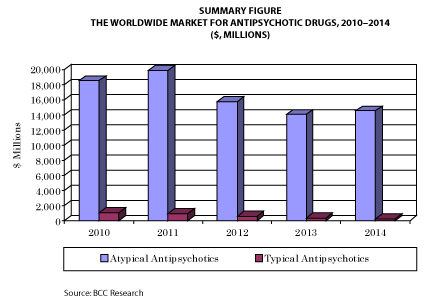July 06, 2010
Wellesley, Mass. – According to a new technical market research report, ANTIPSYCHOTIC DRUGS: TECHNOLOGIES AND GLOBAL MARKETS (NAN043B) from BCC Research (www.bccresearch.com), the global market for antipsychotic drugs was an estimated $18.7 billion in 2009, but is expected to decrease to $14.8 million in 2014, for a 5-year compound annual growth rate (CAGR) of -4.6%.
The largest segment of the market, made up of atypical antipsychotics, is expected to be valued at $14.5 billion in 2014, after decreasing at a CAGR of -3.7% from the estimated 2009 value of $17.6 billion.
The segment made up of typical antipsychotics was estimated to be worth $1.1 billion in 2009, and is expected to decrease at a CAGR of -25.6% to be valued at only $258 million in 2014.
Antipsychotic drugs (also commonly known as neuroleptics) are used to treat psychosis and often the underlying psychiatric conditions that cause psychosis. The primary mechanism of action involved with currently approved antipsychotics is to bind to and act as an antagonist (block) or agonist (stimulate) for dopamine or serotonin receptors in the brain.
Antipsychotic drugs are currently the largest class of pharmaceuticals by sales in the United States. This may not last much longer, though. A period of dynamic change in the antipsychotics market is expected with more than eight currently marketed atypical antipsychotics set to begin facing generic competition in the 2011-2015 time frame. At the same time, several unique new molecular entities or formulations of already approved antipsychotics will be entering the market.
New approaches to treating all the psychosis-related indications are being pursued by pharmaceutical companies, as many of them look to move beyond first- and second-generation antipsychotics. These potential new antipsychotics with novel mechanisms of action or improved delivery systems will provide powerful new options to currently prescribed antipsychotic drugs.
There are many follow-on, second-generation and novel third-generation antipsychotics currently in clinical and preclinical development for indications such as schizophrenia, bipolar disorder, depression, dementia-related psychosis, and agitation. If some of these agents make it to market, they could fill in for lost sales when the atypical antipsychotics face further generic competition.
This study will be of interest to members of the pharmaceutical, healthcare, and biotechnology industries. It also will be a valuable resource for investors in the pharmaceutical sector. It is written in such a way as to be accessible to an investor or businessperson while maintaining a high level of technical detail.

Source: BCC Research
Antipsychotic Drugs: Technologies and Global Markets( PHM063A )
Publish Date: Jun 2010
Data and analysis extracted from this press release must be accompanied by a statement identifying BCC Research LLC as the source and publisher. For media inquiries, email press@bccresearch.com or visit www.bccresearch.com/media to request access to our library of market research.